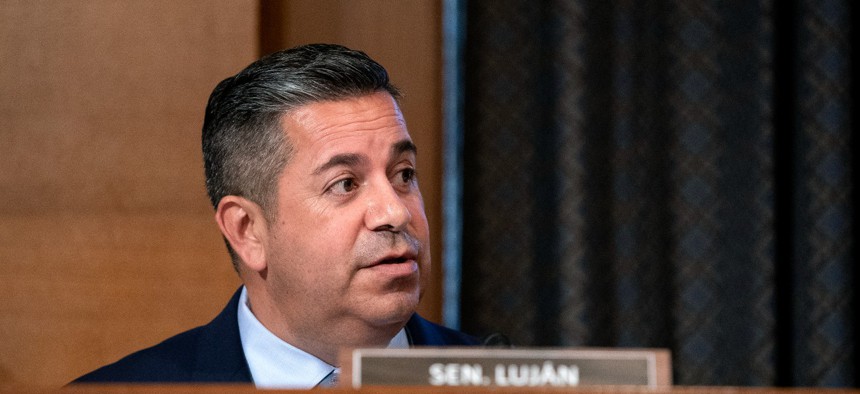
Sen. Ben Ray Luján, D-N.M., introduced the bill last year. Stefani Reynolds-Pool/Getty Images
Congress Has Approved a Measure to Push More FDA and NIH Funds to Their Private Sector Foundations
Lawmakers say the legislation, soon to be signed into law by President Biden, will help bridge gaps between the federal and private sectors to address current and future health crises.
Two health agencies that have played vital roles in the COVID-19 pandemic will soon be eligible to funnel more money to their private, non-profit arms after the House on Monday sent a bill to support their foundations to President Biden’s desk.
The National Institutes of Health Foundation and the Reagan-Udall Foundation for the Food and Drug Administration both operate independently of the federal government but work in close coordination with their partner agencies to facilitate relationships and research between the federal and private sectors. The organizations raise private funds, but also receive annual contributions from NIH and FDA directly. Those transfers are currently capped at just over $1 million, a limit Congress has not raised since 2007.
The Supporting the Foundation for the NIH and the Reagan-Udall Foundation for the FDA Act (S. 1662) will instead set the minimum annual transfer at that current cap, and raise the maximum amount to $5 million for each agency.
“For America to confront the next big public health threat, we need all hands on deck,” said Sen. Ben Ray Luján, D-N.M., when he introduced the bill last year. “The incredible research happening at the FNIH and Reagan-Udall Foundation complements and amplifies the work of the NIH and FDA.”
The foundations administer research programs, support training of new researchers, put on educational events and coordinate public-private partnerships. They aim to encourage more direct interaction with the public and stakeholders, though they are not involved in regulatory or policy decision making. The foundations seek to intervene in areas that would prove more difficult to fund or address if handled exclusively by the federal government or private sector. Both organizations were congressionally chartered—in 1990 for the NIH foundation and 2007 for FDA’s—but are not governmental organizations.
Reps. Richard Hudson, R-N.C., and Anna Eshoo, D-Calif., who introduced companion legislation in the House, said the measure would improve upon that coordination and collaboration, including with key issues impacting the current pandemic such as further testing and vaccine development. The work NIH and FDA have done during the pandemic in partnership with their foundations and the private sector provides evidence of the importance of those relationships and the need for increased funds, the lawmakers said.
"The record-setting development of COVID-19 vaccines has helped our country emerge from this pandemic,” Hudson said. “This legislation will allow the NIH and FDA to build on this success and develop vaccines and treatments sooner working with the private sector.”
The House passed its version of the bill in a bipartisan vote in December, but opted to take up the Senate-passed version on Monday. Rep. Brett Guthrie, R-Ky., said on the House floor the bill would allow NIH and FDA to meet “growing research demands” and provide more flexibility to meet future needs. The House passed the measure unanimously by voice vote.







